SRQ DAILY May 19, 2018

"These literacy experts are vital, but it still takes a community to make Kids READ happen."


Mid-May brings a welcome relief from what many locals find most irksome about “season”: traffic. I recently drove from 301 and 41 in Sarasota all the way to 41 and Florida Boulevard in Bradenton (which is well past the airport) without hitting one red light. That’s just not possible when our snowbirds are here. There’s an interesting counterintuitive caveat in urban planning literature about traffic, that it’s often not the long car trips that clog our roads. Nope, it’s the short trips we make—to the post office, the drug store or the grocery store. The way we have organized our built environment, for many of us, simple tasks of everyday life may only be accomplished with a car. And all those short trips make for lots of traffic. I was reminded of this reality at a Lido Key Neighborhood Association meeting a few months ago.
Sarasota’s iconic John Ringling Bridge can become a parking lot during high season. A friend of mine who lives near the downtown end of the John Ringling Bridge shared that she has friends on Longboat Key who call her during season and ask how the traffic is on the bridge so they can decide whether they should get in the car for their trip to Sarasota’s “mainland”, or wait until it’s less congested. Another friend reports that her buddy on Lido Key carefully plans her day when she ventures into downtown and beyond because bridge traffic is so heavy. A 20-minute trip can become 40 minutes or more each way during season.
At that Lido Key Neighborhood Association Meeting in January, many residents commented about their frustration with traffic and how crossing the bridge took so long. But one woman’s comment really caught my attention. “To do anything,” she said, “to go to the post office, to buy groceries, to fill a prescription, I have to get in the car and cross that bridge.” The packed room was full of neighbors nodding in agreement.
It wasn’t always this way, another resident chimed in. Lido Key used to have a convenience store, a small pharmacy. What happened? I’m not sure how or why those businesses left, but as a neighborhood advocate I’ve learned that many times people perceive a purely residential community as more desirable. A fair criticism of NIMBY (Not in My Backyard) protests may be that advocating for a purely residential built environment in our neighborhoods has made us all auto-dependent to such an extreme that we have to get behind the wheel to do anything—like buy a loaf of bread.
There are surely ways to incorporate commercial and multifamily residential building into Sarasota neighborhoods, which are beautiful, functional and will take pressure off our roads. This kind of building, a mini “Main Street” approach, could include affordable apartments above businesses, which offer everyday services closer to home. Maybe building more bridges and widening roads isn’t the only, or even the best answer to our traffic woes. Maybe building more self-sufficient neighborhoods is.

At a recent speaking engagement I was asked to discuss the role of liberal arts in a well-rounded education. I enjoy discussing this topic because it gives me a chance to do some myth-busting on the misconceptions about a liberal arts education.
Myth No. 1: Science, technology, engineering and math are not “liberal arts.”
With an appreciative nod to my colleague at the New College of Florida, Dr. Donal O’Shea, I can dispel this first myth by stating that today’s liberal arts include Natural and Mathematical Sciences, Social Sciences and Arts and Humanities. A liberal arts education is simply a well-rounded education that prepares a graduate for a career, not just a job.
As Dr. O’Shea has written in the past, the liberal arts originated as the essential subjects and skills required for an ancient Greek or Roman citizen. Today, the word “art” has become narrowly interpreted. A two-year associate in arts degree from State College of Florida, Manatee-Sarasota, is a not a degree in drawing, painting or acting, although any of these activities could contribute to the well-rounded education our students receive to prepare them to transfer to a university.
Myth No. 2: STEM students don’t need to take liberal arts courses.
Some will complain about the requirement to take humanities or social science courses in pursuit of a STEM degree. Instead of thinking only about the content of the subject, consider the activities that occur through these courses—classroom discussions that expose students to new or opposing ideas, writing assignments and presentations to develop communication skills, the study of unfamiliar topics to broaden thinking, to name just a few.
Education must expose us to new things and different viewpoints if we are to develop as people. Graduates must be prepared for the human dynamic in the workforce, not just the skill requirements. Today’s employers value graduates with critical thinking skills, strong verbal and written communication skills and analytical ability. A liberal arts education exposes students to opportunities to develop these skills in addition to the technical skills required to join the workforce. We learn and develop more outside of our comfort zone than tucked safely within.
Myth No. 3: A liberal arts education will not lead to a STEM job.
This myth is easy to knock down. As I stated above, math and science are key components within the liberal arts. Students that embrace the opportunities provided by a well-rounded education on a college campus can even learn the skills employers value in their new employees.
Planning too narrowly can leave graduates vulnerable to an uncertain labor market in which disruptive technologies are a making jobs obsolete. Today’s employment trends indicate that multiple job and career changes over time are the new normal. Graduates need an educational background that will open multiple doors in the job market and prepare them to learn new skills.
Buying into the myths of the liberal arts can limit a student’s opportunities and their ability to adapt to future job markets. At SCF, we want students to gain the skills they need to become employed in their field, the knowledge to be successful over time and the adaptability to navigate the future.
Dr. Carol Probstfeld is president of State College of Florida, Manatee-Sarasota 

Read any good books lately? If you’re someone who looks forward to tackling the venerable “summer reading list,” you probably will soon. It’s that time of year when media outlets and book purveyors start telling us which page-turners everyone will have their noses in this summer.
Many young readers in our community are putting together their own lists. For kids who love to read and are encouraged at home, weekly visits to the school media center often segue seamlessly to regular trips to the local library once summer arrives. But what about our struggling children, who may not have the means to buy books or catch rides to the library?
We now know more than ever about the real threat of “summer slide.” That’s the tendency for students, especially those from disadvantaged backgrounds, to lose learning from the past school year over the summer vacation that follows. For dozens of rising first- and second-graders in Sarasota County, however, Kids READ is a powerful (and fun) new tool to help prevent that setback and prepare students for continued gains next year.
Kids READ is a summer literacy program modeled on the highly successful Reading Recovery initiative in Sarasota County Schools. The latter, which now operates in all of the district’s elementary schools, provides intensive, one-on-one tutoring to help struggling first-grade readers. Kids READ supplements that with focused summer instruction for children who need it most. It targets both rising second-graders who may need help sustaining the trajectory they just achieved and incoming first-graders who need a prep up for the fall.
Kids READ meets these students where they’re at—summer day camps! Throughout June and July, the highly structured program will be offered to targeted students at seven sites, including Boys & Girls Clubs throughout the county, R.L Taylor Community Center in north Sarasota and SKY Family YMCA in Venice.
The program employs the same proven techniques used in Reading Recovery—by employing some of the same teachers who deliver them. These literacy experts are vital, but it still takes a community to make Kids READ happen. Philanthropists, including Gulf Coast Community Foundation donors and Charles & Margery Barancik Foundation, underwrite the program. The wonderful partner sites mentioned above make space available at their facilities, coordinate lessons around all of their other camp activities, and even help identify children who will benefit. Community volunteers pitch in by supporting the paid teachers as reading buddies.
Reading lessons might not be the first image to appear when you picture summer-camp fun. But the ear-to-ear smiles of children who can newly and proudly read will quickly change your mind. I can’t wait to hear how many good books our Kids READ students tell us they’ve enjoyed by the final days of summer!
Dr. Mark S. Pritchett is president/CEO of Gulf Coast Community Foundation. 

As we gear up for the annual Sarasota Powerboat Grand Prix Festival this year, The Argus Foundation would like to congratulate Sarasota County Commission, the Sarasota City Commission and Visit Sarasota County for embracing this important sports tourism event.
The Grand Prix Festival has seen a documented economic impact of $36.2 million last year with 18,500 room nights. As if this weren’t enough, the world-wide television exposure was $1,827,964 through ESPN, Fox Sports and others. This year, the major exposure will be with CBS Sports and it will also include a rerun. This is incredible media exposure for our tourism industry.
Sports tourism was an initiative picked up by The Argus Foundation well before rowing came around. It is an important diversification of our tourism industry and it provides incredible exposure to a higher spending tourist than your typical beach tourist. But Sarasota also gets another return on this investment that needs to be understood.
There are five area non-profits that benefit from these boat races, The Florida Center for Child and Family Development, Children First, The Haven, Loveland Center and Special Olympics. Typically, the county has facilities that they rent out to social service nonprofits. That is not the story here though.
Four of these agencies that benefit from the boat races are in buildings valued at over $20 million that were built by the Suncoast Foundation. These buildings are rented to these non-profits by the Suncoast Foundation for $1 per year. The fifth agency receives financial support.
Suncoast Charities for Children takes the monies raised from the boat races and grants the money to the Suncoast Foundation for repairs and improvements to these buildings, allowing the monies that the service providers receive to stay invested in much needed and many times expensive services.
These grants affect approximately 8,000 kids and adults with special needs and their families. This is money the county and city are saving in social service monies, general fund monies and your taxes.
The Argus Foundation is a proud partner with the Suncoast Charities for Children for the 2018 Sarasota Grand Prix Festival. We are honored to be a part of a 34-year tradition of tourism and philanthropy for our neediest residents. The return on investment from this event is something of which every resident and elected official should be proud.
Congratulations to the local governments for making a smart investment and we look forward to another great year of racing.
Christine Robinson is executive director of The Argus Foundation and a volunteer board member for the Suncoast Charities for Children and Suncoast Foundation. 

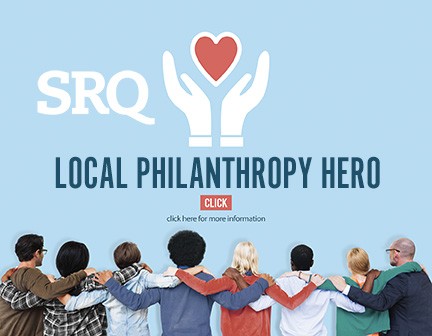
Do you know someone who's making a real difference? Someone whose passion for giving back has had a postivie impact on our comminuty? Nominate them for the SRQ Local Hero Award. It could be an engaged citizen, volunteer or donor organizer who wen't above and beyond this past year to make our region a better place to live, work and play.
The winner will be announced at the SB2 Transformative Philanthropy Luncheon on Thursday July 26 at The Francis, Downtown Sarasota. Panelists will explore the organizations and individuals who are changing the face of the nonprofit world through innovative approaches, strategic alliances and groundbreaking initiatives that foster and employ engagement to make a difference. 

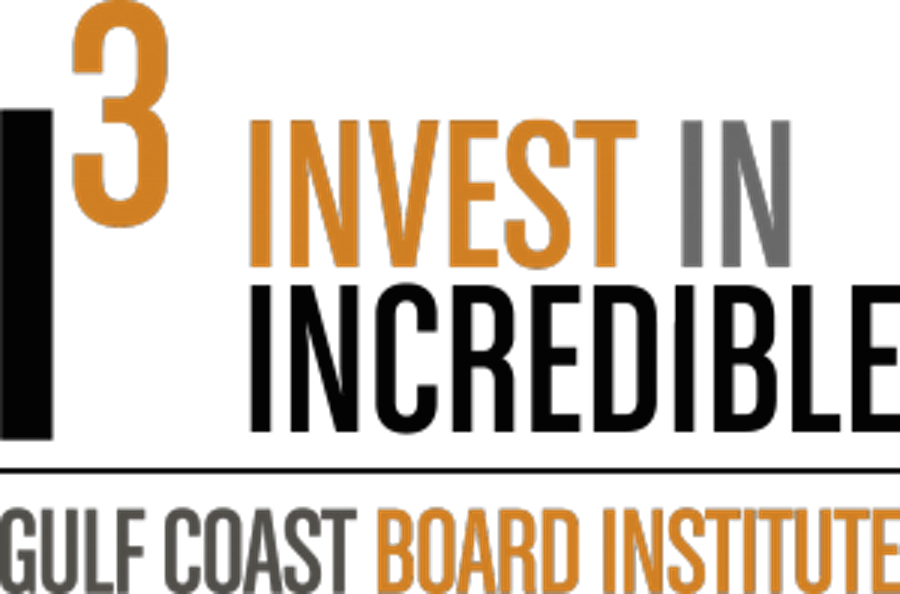
The Gulf Coast Community Foundation is now accepting applications for its Summer 2018 Gulf Coast Board Institute. The Institute is looking for creative, driven applicants to join their high-level governance training series for volunteer, nonprofit board members. The 25 selected applicants will participate in four full-day training sessions from mid-July through early August. All training and resources will be provided at no cost. Applicants must be current board members at a nonprofit and apply by June 8 in order to be considered. 
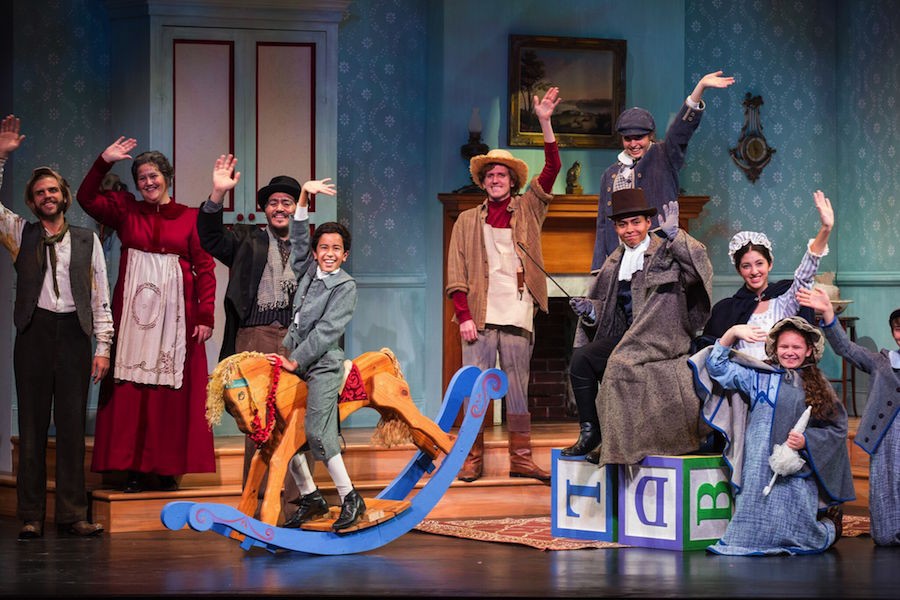
The National Endowment for the Arts approved an Art Works grant of $20,000 to the Sarasota Youth Opera program to support their 2018 production of The Little Sweep by Benjamin Britten. The program has given thousands of students the opportunity to receive first hand opera experience through their after-school programs and summer workshops. The Art Works grant supports projects that focus on promoting higher standards of excellence, public engagement, and lifelong learning in the arts. 

The TableSide Restaurant Group is honoring dads, locals, and tourists with a variety of summer events and dining deals throughout the Sarasota area. Tableside offers indoor and al fresco dining options at Louie’s Modern, Oak & Stone, and Libby’s Café with Father’s Day deals, free giveaways, and beer specials. 
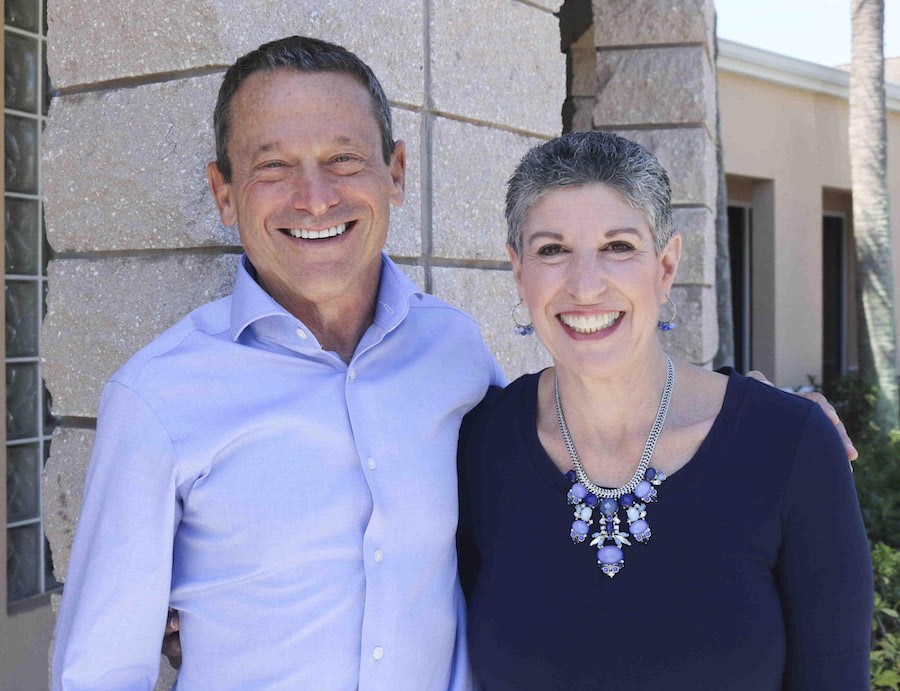
The Jewish Family & Children’s Service of Suncoast recently appointed Dean Miller to the position of Board Chair Elect. For over 35 years, Miller has held senior leadership positions in financial and business risk services and international business experience through his posts in Asia and Europe. A graduate of the University of Virginia, Miller has been a Sarasota resident since 2002 and was a member of the JFCS Board for the past two years. 

While the Sailor Circus Arena on Bahia Vista is under construction, the Circus Arts Conservatory will hold their Circus Summer Camp in the Sarasota High School gymnasium. The camp is open to children ages 6-15 who can participate in one-week or two-week sessions. Campers will be introduced to triple and single trapeze, clowning, juggling, and more. At the end of the week, the campers demonstrate their new skills with a costumed performance to friends and family. 
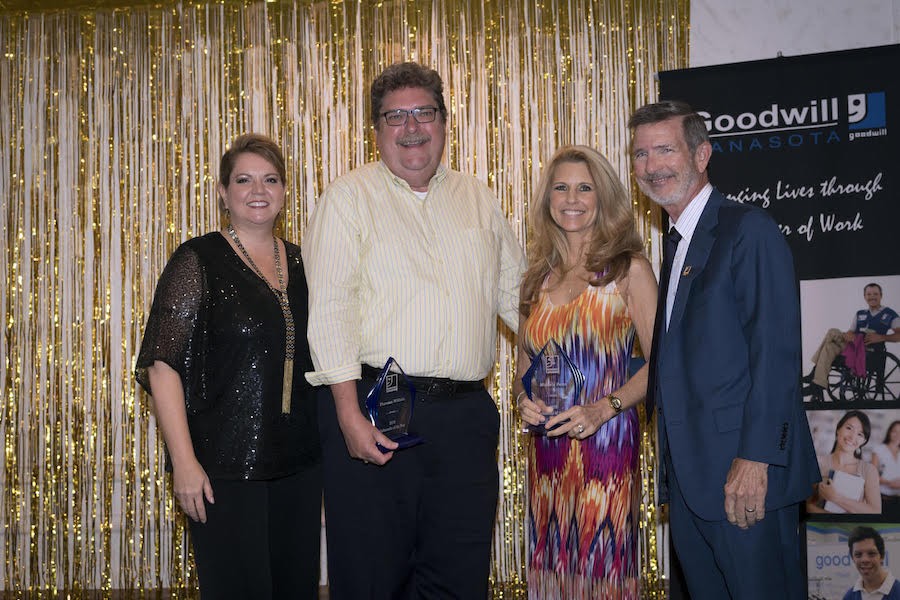
Goodwill Manasota recently held its sixth annual Ambassador Recognition Luncheon, which recognizes individuals and businesses who share the mission of Goodwill with the greater community. Since 2011, the Ambassador program has attracted almost 10,000 participants and has worked to connect volunteers to the philanthropic community. For the first time, the Ambassador of the Year award went to two honorees, Michele Penn and Thomas Wiltsie. In addition to honoring those in the community, the organization also acknowledged the 2018 Goodwill marketing team and their campaign, “Thanks! I got it at Goodwill.” 
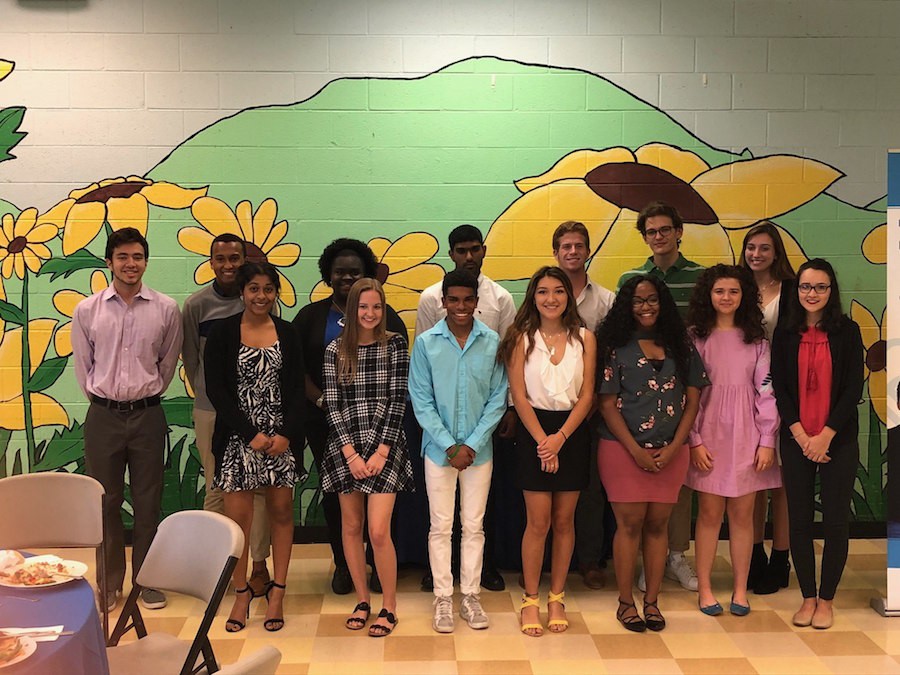
The Boys & Girls Clubs of Sarasota County celebrated a group of local seniors at the agency’s annual Senior Banquet and Graduation Celebration. The event is funded by a grant from the Taco Bell Foundation, an organization that empowers youth to pursue a college degree or career after high school. The banquet featured over 60 teens that had been involved in various leadership, service, or workforce development opportunities provided by the Boys & Girls Club. Special recognition and awards were dedicated to seniors who have demonstrated a commitment and service in their community. 

SRQ DAILY is produced by SRQ | The Magazine. Note: The views and opinions expressed in the Saturday Perspectives Edition and in the Letters department of SRQ DAILY are those of the author(s) and do not imply endorsement by SRQ Media. Senior Editor Jacob Ogles edits the Saturday Perspective Edition, Letters and Guest Contributor columns.In the CocoTele department, SRQ DAILY is providing excerpts from news releases as a public service. Reference to any specific product or entity does not constitute an endorsement or recommendation by SRQ DAILY. The views expressed by individuals are their own and their appearance in this section does not imply an endorsement of them or any entity they represent. For rates on SRQ DAILY banner advertising and sponsored content opportunities, please contact Ashley Ryan Cannon at 941-365-7702 x211 or via email |
Powered by Sarasota Web Design | Unsubscribe












